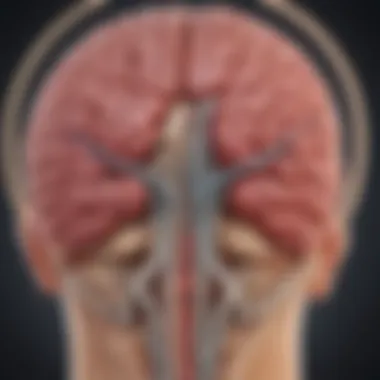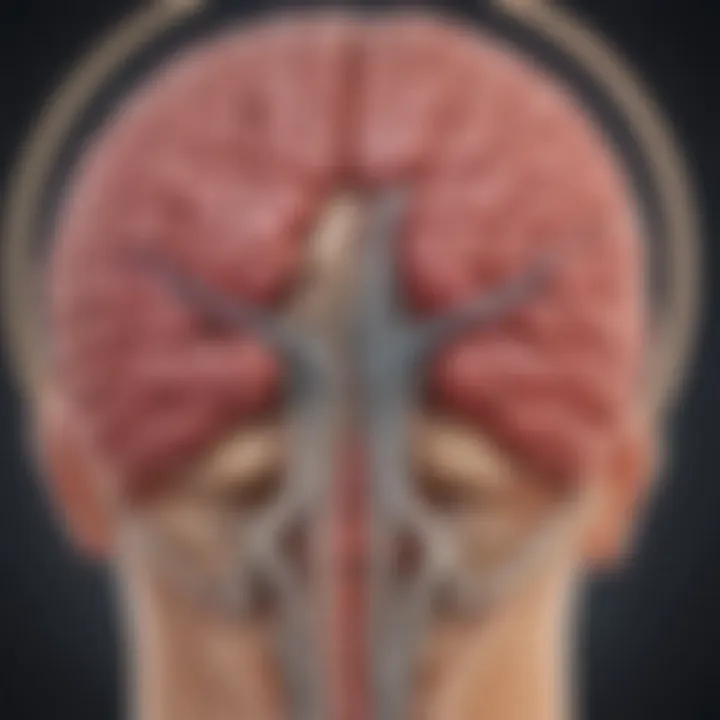Understanding Pituitary Tumors and Memory Function


Intro
Pituitary tumors play a significant role in cognitive function, particularly in memory. These tumors, though often benign, can lead to serious complications, including changes in hormone levels and brain function. Understanding how pituitary tumors affect memory is crucial for early diagnosis and effective treatment. This article seeks to explore the intricate connections between these tumors and memory impairment, and how they can profoundly impact a person’s life.
Recent Advances
Latest Discoveries
Recent research has shed light on how different types of pituitary tumors, like adenomas and carcinomas, can lead to various forms of memory dysfunction. For instance, studies in neuroscience have noted that hormonal imbalances caused by these tumors may affect areas of the brain responsible for memory processing, such as the hippocampus.
Additionally, electroencephalogram (EEG) findings have indicated patterns of abnormal brain activity in patients with pituitary tumors, correlating these patterns with difficulties in memory recall and formation.
Technological Innovations
Innovative imaging techniques have emerged, enhancing our understanding of pituitary tumors and their effects on memory. Functional MRI (fMRI) allows researchers to observe real-time brain activity and how it changes in response to tumor growth. This technology helps differentiate between memory issues arising from tumor presence versus those from other potential causes.
Mechanisms of Memory Impairment
The impairment of memory functions can arise through various mechanisms related to pituitary tumors:
- Hormonal Disruption: Altered hormone levels can lead to mood changes, fatigue, and cognitive difficulties.
- Structural Changes: Tumor growth may exert pressure on adjacent brain structures, disrupting normal function.
- Psychological Factors: The stress of a diagnosis can also exacerbate memory issues, affecting mental health and cognitive clarity.
Diagnostic Approaches
To accurately assess the impact of pituitary tumors on memory, various diagnostic tools are employed:
- Neuropsychological Testing: These evaluations help in measuring different aspects of cognitive functioning, including memory.
- Imaging Techniques: MRIs and CT scans assist in visualizing tumor structure and its effects on surrounding brain areas.
- Hormonal Assessments: Blood tests can gauge hormone levels, suggesting potential disruptions caused by tumors.
"Recognizing the link between pituitary tumors and memory loss is vital for improving patient outcomes. Early diagnostics can guide effective treatment strategies."
Treatment Options
Treating pituitary tumors typically involves a combination of approaches:
- Surgical Techniques: Surgical removal of the tumor remains a primary method, especially for large adenomas.
- Medications: Hormonal therapies can help restore balance and reduce symptoms associated with memory loss.
- Radiation Therapy: In some cases, targeted radiation may be necessary to control tumor growth and minimize the cognitive effects.
Importance of Early Intervention
Early intervention is key in managing the cognitive decline associated with pituitary tumors. Recognizing symptoms early allows for prompt diagnostic procedures and treatment. This proactive approach not only addresses memory issues but also enhances the overall quality of life for patients.
As research progresses and more information becomes available, the understanding of the relationship between pituitary tumors and memory function will only deepen. This knowledge will ultimately aid healthcare professionals in providing more tailored care to those affected.
Prelude to Pituitary Tumors
The exploration of pituitary tumors is crucial for understanding their potential effects on cognitive functions, particularly memory. The pituitary gland plays a significant role in various hormonal and physiological processes. When tumors develop in or around this gland, they can disrupt hormonal balances and lead to several cognitive impairments, such as memory loss. It is essential to grasp the types of these tumors, their pathophysiology, and how they can interfere with normal brain function.
Definition and Classification
Pituitary tumors can be classified as either functional or non-functional. Functional tumors produce hormones, disrupt normal hormonal levels, and lead to symptoms related to hormone excess. Examples include prolactinomas and growth hormone-secreting adenomas. Non-functional tumors, on the other hand, do not produce hormones but can still exert pressure on surrounding brain structures, leading to symptoms such as headaches or vision changes. Within these categories, further classification can be based on the size of the tumors and their histological characteristics. Most are adenomas, benign growths that rarely progress to malignancy. However, understanding the exact classification is critical for determining treatment strategies and predicting patient outcomes.
Epidemiology and Prevalence
Pituitary tumors are relatively common, with a prevalence estimated at approximately 1 in 1,000 individuals. Despite their frequency, awareness about these tumors can be low within the general population. They are often diagnosed in adults aged 30 to 50, but can occur in any age group. Women are more frequently affected by certain types of functional tumors, such as prolactinomas. The actual incidence may be underestimated due to the often asymptomatic nature of these tumors in their early stages. Regular monitoring and advanced imaging techniques have contributed to an increase in diagnosed cases over the years.
"Understanding the epidemiology of pituitary tumors helps in early detection and better management strategies, ultimately improving patient outcomes."
In summary, a thorough understanding of pituitary tumors involves both their definition, classification, and prevalence in the population. This knowledge lays the foundation for delving deeper into their implications on memory function, which is critical for enhancing patient care.
Understanding Memory Function
Memory function is a critical aspect of cognitive health, influencing how individuals learn, recall information, and engage with the world. Within the context of pituitary tumors, understanding memory function is essential. Tumors in the pituitary gland can lead to hormonal imbalances and changes in brain structure, which may adversely affect memory. This article will highlight various elements of memory function, delving into its neurobiology and types, to provide comprehensive insight into how disturbances can occur due to pituitary tumors.
The Neurobiology of Memory
Memory is a complex process that entails multiple brain regions working in unison. The hippocampus is often regarded as the primary site for the formation of new memories. It interacts closely with other areas, such as the prefrontal cortex, which plays a vital role in recalling and utilizing information. Neurotransmitters, particularly glutamate and acetylcholine, facilitate communication between neurons, making memory storage and retrieval possible.
When pituitary tumors disrupt hormonal balance, there can be changes in neurotransmitter levels, affecting this delicate network. Low levels of growth hormone, for instance, may impair the development of new neuronal connections, essential for effective memory processing.
Types of Memory
Understanding the various types of memory adds depth to the discussion of the effects of pituitary tumors on cognitive function.
Short-term Memory
Short-term memory serves as a temporary holding space for information. It is fundamental for everyday tasks, such as retaining a phone number long enough to dial it. The key characteristic of short-term memory is its limited capacity, typically allowing us to hold about seven items at once. This attribute makes it particularly vulnerable to disruption.


In the context of pituitary tumors, hormonal changes can lead to fluctuations in concentration and attention, impacting this type of memory. Short-term memory's efficiency is critical in the daily functioning of individuals.
Long-term Memory
Long-term memory is where information is stored for extended periods, from hours to decades. It comprises both explicit memories, which are consciously recalled, and implicit memories, which influence our behavior without conscious awareness.
The robust nature of long-term memory persists despite surface alterations in cognition. However, pituitary tumors can lead to long-term memory deficits through growth hormone deficiency or by compressing adjacent brain regions crucial for memory storage. The complexity and richness of long-term memory make it a valuable area of study in relation to cognitive health.
Working Memory
Working memory is a dynamic system used for temporarily holding and manipulating information. It plays a significant role in reasoning and decision-making. A critical aspect of working memory is its capacity to integrate new information with previously learned concepts.
Though this system is highly adaptive, it is also sensitive to disruptions caused by tumor-related hormonal fluctuations. People may find it difficult to process information in real-time, affecting problem-solving skills and adaptive functioning in everyday situations.
Memory function is a cornerstone of cognitive health, making understanding its mechanisms vital when evaluating conditions affecting the brain.
Mechanisms Linking Pituitary Tumors to Memory Loss
Understanding how pituitary tumors impact memory function is crucial for diagnosing and managing cognitive impairments in affected patients. The relationship between these tumors and memory loss involves several biological mechanisms that are essential to comprehend. Recognizing these mechanisms helps clinicians and researchers develop effective strategies for treatment and support. The focus will be on two main categories: hormonal changes and direct brain effects.
Hormonal Changes
Hormonal alterations stemming from pituitary tumors play a significant role in memory function. This section dives into the influence of specific hormones, such as prolactin and growth hormone, on cognitive abilities.
Impact of Prolactin
Prolactin levels can be significantly elevated in patients with pituitary tumors. This hormone is primarily known for its role in lactation, but its effects extend to various brain functions. Increased prolactin may lead to disruptions in neural pathways that support memory. Research indicates a correlation between elevated prolactin and cognitive decline. The ability of prolactin to modulate neurotransmitter activity represents its key characteristic. This influence on neurotransmission is vital because it suggests potential interventions targeting these pathways.
On the other hand, the elevation of prolactin can have side effects, such as fatigue and depressive symptoms, complicating the clinical picture. Understanding this relationship emphasizes the importance of monitoring prolactin levels in patients with pituitary tumors.
Effects of Growth Hormone Deficiency
Another hormonal factor is the deficiency of growth hormone, which frequently occurs in patients with pituitary tumors. Growth hormone is critical for maintaining cognitive function, as it affects neuronal growth and repair. Deficiency can lead to notable impairments in memory. The key characteristic of this deficiency is its broad impact on brain plasticity, which is fundamental for learning and memory processes.
The unique feature here is the potential for restoration of cognitive function with appropriate treatment of growth hormone deficiency. This can significantly enhance the quality of life for patients. However, initiating hormone replacement therapy should be approached with caution due to possible adverse effects, including joint pain and swelling.
Direct Brain Effects
Pituitary tumors can exert direct effects on the brain through pressure on surrounding structures and altered cerebrospinal fluid dynamics. These effects complicate the understanding of how tumors influence memory.
Pressure on Surrounding Structures
The physical presence of a tumor can apply pressure to adjacent brain regions, which is detrimental to cognitive function. The specific aspect of this pressure often results in headaches, visual disturbances, and other neurological symptoms. One key characteristic of this pressure is its potential to disrupt the functioning of critical memory-related areas, such as the hippocampus. The benefit of discussing this effect lies in recognizing that early detection of tumor growth can help minimize such pressures and associated cognitive deficits.
However, these physical effects can lead to permanent damage if not addressed promptly. Clinicians must stay vigilant for symptoms that might indicate increased pressure.
Altered Cerebrospinal Fluid Dynamics
Cerebrospinal fluid plays an essential role in protecting and nourishing the brain. Tumors can alter the flow and circulation of this fluid. This alteration creates an imbalance, which may negatively impact cognitive functions, particularly memory. The unique feature of addressing this aspect involves understanding how cerebral circulation supports various brain functions.
The advantages of monitoring cerebrospinal fluid dynamics are significant. By identifying alterations early, healthcare providers may implement measures to alleviate potential detrimental effects on memory. It emphasizes an interdisciplinary approach to patient care involving neurologists, endocrinologists, and neurosurgeons.
Understanding the interplay between hormonal changes and direct effects facilitates more effective interventions and aids in improving cognitive outcomes.
In summary, the mechanisms linking pituitary tumors to memory loss include hormonal alterations and direct brain impacts. Recognizing and addressing these mechanisms equips healthcare professionals with the knowledge to enhance patient care and memory function.
Symptoms of Pituitary Tumors
Understanding the symptoms associated with pituitary tumors is essential for early detection and intervention. Symptoms can vary significantly depending on the tumor type, size, and location. Identifying these symptoms can aid healthcare professionals in formulating an effective patient care plan.
Recognizing these signs also contributes to greater public awareness, which can lead to increased research funding and support for individuals suffering from these conditions. The interplay between physical and cognitive symptoms forms the foundation for understanding how pituitary tumors affect overall health.
Physical Symptoms
Physical symptoms are often the most noticeable manifestations of pituitary tumors. They arise due to hormonal imbalances or pressure on nearby structures. Common physical symptoms include:
- Headaches: Frequent and persistent headaches may signal changes in intracranial pressure caused by tumor growth.
- Vision Problems: Tumors may compress optic nerves, leading to blurred vision or vision loss. This effect can vary in severity, often presenting as peripheral vision loss.
- Hormonal Changes: Abnormalities in hormone production can lead to weight changes, menstrual irregularities, or decreased libido. Specific conditions like Cushing’s disease cause prominent physical symptoms, such as increased fat around the abdomen and a rounded face.
- Fatigue: Unexplained fatigue often accompanies hormonal imbalance, affecting daily life and overall well-being.
These symptoms have significant implications for patient quality of life. They can lead to increased stress levels, alter social and family dynamics, and may require additional medical evaluation. Recognizing the physical manifestations of pituitary tumors facilitates timely medical interventions, potentially reducing the risk of severe cognitive dysfunction later.
Cognitive and Emotional Symptoms
Cognitive and emotional symptoms are deeply intertwined with the physical manifestations of pituitary tumors. Hormonal imbalances significantly impact mood and cognitive abilities. Common cognitive and emotional symptoms include:
- Memory Loss: Many patients experience difficulties with short-term memory retrieval, which can be frustrating.
- Difficulty Concentrating: This symptom often compounds memory problems, leading to challenges in task completion and decision-making.
- Mood Swings: Patients may notice heightened irritability or emotional distress due to hormonal fluctuations. It can create a sense of instability in a person's emotional state.
- Depression and Anxiety: The challenges of living with a medical condition contribute to increased anxiety and depression rates.


Research shows that cognitive symptoms can be among the first indicators of pituitary dysfunction and should be monitored closely.
It is crucial to consider both physical and cognitive symptoms in diagnostic evaluations. Their presence not only indicates the need for further testing but also informs potential treatment strategies. Understanding the entire spectrum of symptoms related to pituitary tumors allows healthcare providers to tailor patient care effectively, addressing both physical and emotional needs.
Diagnostic Approaches
Imaging Techniques
MRI Scans
MRI scans are often the preferred imaging technique for diagnosing pituitary tumors due to their superior ability to visualize soft tissue structures. An MRI utilizes magnetic fields and radio waves to generate detailed images of the brain, allowing for clear identification of tumor size, shape, and location. This is particularly relevant when considering how tumors might affect surrounding brain areas involved in memory function.
A key characteristic of MRI scans is their high-resolution imaging capabilities. This detail facilitates a more accurate assessment of the tumor’s impact on neural structures. One unique feature of MRI is its non-invasive nature, eliminating the risks associated with exposure to ionizing radiation, which is a notable advantage over other imaging methods.
However, MRI scans can take longer than other imaging options. Patients may need to remain still in a confined space for an extended period, which can be uncomfortable. Additionally, accessing an MRI facility may not always be immediately possible, depending on the healthcare system.
CT Scans
CT scans offer another avenue for imaging pituitary tumors. This technique combines X-ray images taken from various angles to create cross-sectional views, presenting a comprehensive look at the brain structure. CT scans are often quicker than MRI scans, making them a useful tool in emergency situations where immediate assessment is necessary.
The key characteristic of CT scans is their ability to detect calcifications within tumors. This feature aids in distinguishing between different types of pituitary tumors, influencing subsequent treatment choices. In terms of availability, CT scans are widely accessible and can be performed in many healthcare facilities.
On the downside, CT scans expose patients to ionizing radiation, raising concerns regarding safety, particularly for those requiring multiple scans over time. Moreover, the resolution may not be as high as MRI scans, potentially limiting the evaluation of soft tissue details sufficient for effective treatment planning.
Hormonal Testing
Hormonal testing is essential for evaluating the functional activity of pituitary tumors. Many of these tumors are classified based on the hormones they secrete, which can significantly impact one’s overall health, including cognitive function. By measuring hormone levels, healthcare professionals can determine how a pituitary tumor might be contributing to memory loss or other cognitive impairments. This diagnostic method helps to create a complete clinical picture, informing both immediate and long-term care strategies.
Treatment Options for Pituitary Tumors
The treatment options for pituitary tumors are vital in managing not only the tumor itself but also the subsequent cognitive impairment that may arise, particularly memory loss. Effective treatment usually requires a comprehensive approach, as individual responses to therapy can differ greatly. Early and appropriate intervention can greatly influence the long-term cognitive health of a patient. Hence, understanding these treatment modalities is key for healthcare providers, patients, and their families.
Surgical Approaches
Surgical intervention is often considered the cornerstone of treatment for symptomatic pituitary tumors. The primary goal of surgery is to remove the tumor as completely as possible while preserving surrounding brain tissue and functionality. Neurosurgeons may opt for a transsphenoidal approach, entering through the nasal cavity, which provides a less invasive means to access the pituitary gland.
Benefits of Surgical Approaches:
- Tumor Removal: Complete resection can lead to immediate relief from pressure symptoms, which may help alleviate cognitive dysfunction.
- Hormonal Normalization: For secreting tumors, surgery often results in the restoration of normal hormone levels, positively influencing physical and mental well-being.
- Diagnostic Value: Surgical procedures allow for tissue sampling, contributing to accurate diagnosis and treatment planning.
Considerations:
- Risks and Complications: As with any surgical procedure, there can be complications including infection, bleeding, or damage to surrounding structures.
- Recovery Time: Patients will typically require a recovery period, during which monitoring for potential cognitive issues is crucial.
Radiation Therapy
Radiation therapy may serve as an alternative or adjunctive treatment for pituitary tumors. It is particularly useful for patients who cannot undergo surgery for medical reasons or for those with residual tumor post-surgery. Techniques such as stereotactic radiosurgery allow for precise delivery of radiation aimed at minimizing damage to healthy tissue.
Benefits of Radiation Therapy:
- Non-invasive: This approach avoids the complications associated with surgical recovery, offering an alternative that can be less taxing on the patient.
- Targeted Treatment: Modern techniques allow for localized targeting of the tumor, possibly resulting in fewer side effects.
- Long-term Control: Radiation can help in controlling tumor growth, with effects often seen over time rather than immediately.
Considerations:
- Side Effects: Patients may experience fatigue, headaches, or cognitive changes, which necessitate careful monitoring.
- Delayed Effects: The benefits of radiation can take months or even years to fully manifest, complicating management strategies.
Medical Management
Medical management is essential, particularly for patients with hormonal imbalances caused by their tumors. This treatment often involves hormone replacement therapy as well as medications tailored to treat the specific type of tumor. For instance, dopamine agonists may be employed in the case of prolactin-secreting tumors, effectively controlling tumor size and normalizing hormone levels.
Benefits of Medical Management:
- Symptom Control: Proper medication can alleviate symptoms related to hormonal deficiencies, thereby improving quality of life.
- Considerably Less Risky: Compared to surgical or radiation approaches, medication-based treatment generally carries fewer risks.
Considerations:
- Compliance: Long-term adherence to medication regimens can be a challenge for some patients.
- Monitoring: Regular follow-up is essential to adjust medication dosages and to prevent potential adverse effects.
The Role of Early Intervention
Early intervention in cases of pituitary tumors is crucial for optimizing patient outcomes, particularly regarding memory function. When a pituitary tumor is detected at an early stage, patients may have better treatment options available, which can lead to reduced complications and improved quality of life. Early detection does not just allow for timely medical or surgical interventions but also aids in monitoring changes in cognitive function.
Importance of Regular Monitoring
Regular monitoring is paramount when addressing the effect of pituitary tumors on memory. This involves consistent assessment of cognitive abilities, hormonal levels, and tumor growth through imaging techniques. One essential aspect is recognizing that cognitive impairment may not be immediate after a tumor diagnosis. Cognitive assessment should be an integrated part of regular follow-up care. This ongoing evaluation helps tailor treatment plans and adjust hormonal therapies to alleviate any cognitive deficits arising from the tumor.


Benefits of regular monitoring include:
- Identification of Changes: Spotting early signs of cognitive decline can facilitate timely responses to changes in treatment.
- Personalized Treatment Plans: Regular assessments allow healthcare providers to refine management strategies based on each patient’s evolving needs.
- Enhanced Understanding of Tumor Behavior: Ongoing imaging can reveal trends in tumor progression that might directly correlate with cognitive function changes.
The significance of this monitoring becomes more evident when considering the diverse nature of pituitary tumors. Each tumor’s impact can vary significantly based on its type and location. Close observation enables healthcare professionals to create targeted interventions that address specific areas of cognitive decline.
Impact on Long-term Cognitive Health
The long-term cognitive health of patients with pituitary tumors can be heavily influenced by early intervention strategies. When interventions are undertaken promptly, there is a higher chance of preserving and even enhancing cognitive functions. This is especially vital for areas like memory, which can be susceptible to the hormonal imbalances caused by these tumors.
Research indicates that untreated hormonal deficiencies may lead to irreversible cognitive impairment. Therefore, ensuring that any hormonal deficiencies are addressed quickly can mitigate significant risks. Patients with active management of hormonal levels— achieved through medications or surgeries—tend to have a better prognosis regarding cognitive outcomes. Additionally, psychological support and cognitive rehabilitation may also be offered as part of an integrative approach to care.
Some key considerations regarding the long-term impact include:
- Reduced Risk of Cognitive Decline: Active intervention lowers the probability of severe cognitive deficits developing over time.
- Improved Quality of Life: Maintaining cognitive functioning contributes to overall well-being, enhancing social interactions and daily activities.
- Support for Family and Caregivers: An understanding of the cancer's implications on cognitive health helps families manage challenges better.
In summary, the role of early intervention in the management of pituitary tumors cannot be understated. It plays a pivotal part in sustaining cognitive integrity and improving overall health outcomes for patients. As knowledge grows regarding these tumors, so does the imperative for proactive monitoring and intervention strategies.
Recent Research Findings
Recent research in the field of pituitary tumors has provided significant insights into the connection between these tumors and cognitive function, particularly regarding memory. Understanding these findings is crucial for several reasons. First, it helps shapedour approach to diagnosis and treatment of patients experiencing memory issues related to pituitary tumors. Additionally, recognizing the implications of these studies can support healthcare providers in monitoring and recommending interventions for patients at risk. Finally, this research paves the way for more targeted studies aiming to mitigate cognitive impairment in individuals with pituitary tumors.
Studies on Cognitive Impairment
Recent studies have targeted the nuances of cognitive impairment that arise from pituitary tumors. Research has shown that individuals with pituitary adenomas often demonstrate deficits in various cognitive functions including memory, attention, and executive tasks.
A few notable studies in this area include:
- Longitudinal Studies: These studies have followed patients over time, documenting cognitive changes post-treatment. Results indicate that patients may experience only mild cognitive deficits initially, but these can worsen if interventions are not administered promptly.
- Comparative Analysis: Researchers have compared the cognitive functions of patients with pituitary tumors to those with other neurological conditions. These studies reveal that while there is some overlap in symptoms, the underlying causes can vary significantly, leading to different treatment protocols.
Additionally, there have been efforts to quantify the extent of memory impairment using standardized testing. The findings consistently support the notion that memory, particularly working memory, is notably affected in individuals with pituitary tumors.
Correlation Between Tumor Size and Memory Loss
One important aspect of recent research has been the correlation between tumor size and the degree of memory loss. Larger tumors often exert more pressure on surrounding structures and can disrupt normal hormonal balance. As a result, studies have shown that:
- Increased Tumor Volume: There is a measurable relationship between greater tumor size and more pronounced memory deficits. This suggests that monitoring changes in tumor size could be essential in predicting cognitive decline in patients.
- Hormonal Influence: Larger tumors can also lead to higher levels of hormonal disruptions. For example, increased prolactin has been specifically linked to poorer memory performance, which underscores the need for hormonal assessment in these cases.
Furthermore, advanced imaging techniques have allowed for better visualization of the relationship between tumor growth and cognitive function. Findings indicate that prompt surgical interventions, especially in larger tumors, can lead to improvements in both hormonal levels and cognitive outcomes. The trend confirmed over multiple studies indicates that early treatments may protect memory functions, emphasizing the importance of timely diagnostics and therapeutic strategies.
The End
This topic matters because it connects clinical practice to cognitive health. Memory issues can greatly affect a person’s quality of life. Knowledge of how pituitary tumors contribute to memory loss can empower patients, guiding them toward informed discussions with their healthcare providers.
Additionally, comprehending the potential cognitive implications enhances the overall treatment approach. Recognizing symptoms early can lead to timely interventions that might mitigate memory impairment, aligning therapy with individual needs.
In sum, the relationship between pituitary tumors and cognitive function is complex but essential. Meaningful dialogues on this topic can promote better patient outcomes.
Summary of Key Points
- Pituitary tumors can affect memory function through hormonal changes and direct pressure on brain structures.
- Different types of memory—short-term, long-term, and working—are impacted variably.
- Symptoms include both cognitive and emotional challenges, affecting daily activities.
- Diagnosis methods vary from imaging techniques like MRI and CT to hormonal assessments.
- Timely treatment options such as surgery, radiation, and medical management exist and can help restore some cognitive function.
- Early intervention is vital for preserving long-term cognitive health.
- Recent studies suggest correlations between tumor size and memory function, indicating a need for ongoing research in this field.
Future Directions in Research
Future research should focus on several key areas:
- Longitudinal studies to understand the progression of memory deficits in patients with pituitary tumors over time.
- Exploration of hormonal therapies that specifically target cognitive health in these patients.
- Investigations into the impact of robust monitoring, which can inform treatment plans more effectively.
- Connections between genetic factors and tumor-related memory loss may unveil valuable insights.
Establishing collaborations across various medical and psychological disciplines can also enhance the understanding of this complex issue.
By continually exploring these pathways, we can work toward more effective treatments and, ultimately, improvements in the lives of those affected by pituitary tumors.
Importance of High-quality References
High-quality references provide validated data and insights, ensuring that the content is rooted in sound science. This is particularly pertinent given the intricate relationship between hormones, brain function, and memory. By referencing peer-reviewed studies, clinical trials, and expert analyses, this article enhances its authority and reliability. Here are key considerations about references:
- Credibility: Citing recognized journals, such as the Journal of Clinical Endocrinology & Metabolism, elevates the trustworthiness of the information shared.
- Depth of Knowledge: Each reference opens doors to complex discussions, offering readers a chance to dive deeper into aspects such as hormonal changes or direct brain effects caused by pituitary tumors.
- Guidance: References act as a roadmap, guiding readers toward additional resources for a broader understanding of the topic.
Benefits for Various Audiences
For diverse groups including students, researchers, educators, and healthcare professionals, the references serve distinct purposes:
- Students: Gain foundational knowledge and develop critical thinking by exploring academic papers.
- Researchers: Identify gaps in existing studies and potentially build upon them.
- Educators: Use references to design effective curricula and educate others about the implications of pituitary tumors.
- Healthcare Professionals: Stay abreast of the latest findings that could influence patient care and treatment options.
As such, it is imperative to ensure that the references selected are not only relevant but also up-to-date and peer-reviewed, allowing the article to stand as a reliable source of information in an ever-evolving field.
A Call for Continued Research
The importance of referencing within this article extends beyond mere citation; it underscores the critical need for continued research in understanding the relationship between pituitary tumors and memory function. Through systematic study, the scientific community can enhance therapeutic interventions and improve patient outcomes in cognitive health.
"The depth of understanding in scientific writing hinges on the quality and relevance of its references; they are the backbone upon which knowledge stands."















